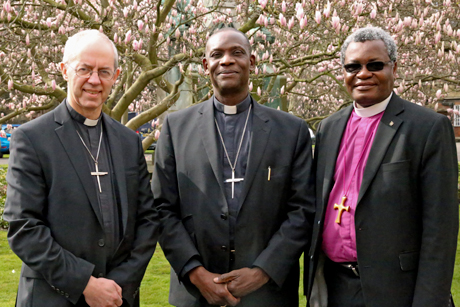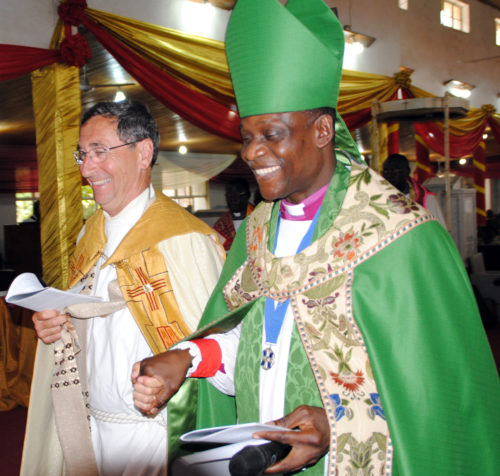Idowu-Fearon ‘committed to God’s mission of reconciliation’Nigerian bishop's appointment as Anglican Communion secretary general celebratedPosted Apr 8, 2015 |
|

Archbishop Josiah Idowu-Fearon (center) with Archbishop of Canterbury Justin Welby (left) and Bishop James Tengatenga, chair of the Anglican Consultative Council. Photo: ACNS
[Episcopal News Service] Many Anglican and Episcopal leaders are celebrating the appointment of Archbishop Josiah Idowu-Fearon of the Anglican Diocese of Kaduna, Nigeria, as the next secretary general of the Anglican Communion.
“Josiah is, above all, a man of communion, a careful listener, and a respecter of the different ways in which we are called to articulate and live the good news of God in Jesus Christ,” former Presiding Bishop Frank Griswold told Episcopal News Service following the appointment.
Griswold served alongside Idowu-Fearon on the International Anglican Conversations on Human Sexuality appointed by former Archbishop of Canterbury George Carey following the 1998 Lambeth Conference of bishops.
“Though we came from very different contexts, our divergent points of view in no way threatened our mutual respect or our ability to recognize one another as true brothers in Christ,” said Griswold, who as the 25th presiding bishop invited Idowu-Fearon to preach at the Sunday Eucharist at the 2003 General Convention in Minneapolis “because I wanted the Episcopal Church to have the benefit of his gracious spirit and his particular perspective in aid of broadening our understanding and appreciation of brother and sister Anglicans in a context very different from our own.”
Griswold and Idowu-Fearon also were panelists on an October 2004 public discussion in London, sponsored by the Pew Forum on Religion and Public Life, dealing with issues affecting the Anglican Communion. “Some present expected that Bishop Josiah and I would exchange bitter words and were disappointed by the obvious trust and affection that existed between us,” Griswold said. “I have every expectation that he will be a blessing to the whole Communion in the days ahead.”
The appointment initially was met with mixed reactions, with claims that Idowu-Fearon supported the criminalization of homosexuality in Nigeria, specifically referring to a 2014 sermon and a 2007 interview. Idowu-Fearon was quick to refute those claims, calling the stories misleading.
“I have never supported the law in Nigeria that criminalizes the gay community and I will never support it,” Idowu-Fearon said in an April 6 statement. “The church is called to love and protect everyone without discrimination, ‘love the person but hate the sin’ whatever the sin may be, corruption, sexual sins of all kinds, misuse of power or anything else.
“For the majority of African Christians, the Bible judges culture, including African culture. As African Christians we must accept other cultures and the way they also understand the Bible’s relationship with culture,” he added. “I accept and promote a culture of respect for such differences.”
Connecticut Bishop Ian Douglas, a member of the Standing Committee of the Anglican Communion, said he has known Idowu-Fearon for more than a decade through a variety of inter-Anglican bodies and responsibilities and finds him “committed to God’s mission of reconciliation, both between people of different faiths and between the churches of the Anglican Communion.”
Douglas told ENS that while Idowu-Fearon was studying at Hartford Seminary in the 1990s, the Nigerian bishop developed many close friendships with leaders and parishes in the Episcopal Church in Connecticut. “These relationships continue to this day, and … have helped us to better know and live the fullness our unity in Christ,” Douglas said.
One such relationship is with Trinity Episcopal Church in Tariffville, which every summer sponsors a medical mission trip to Idowu-Fearon’s Diocese of Kaduna in Northern Nigeria.

The Ven. Tom Furrer, rector of Trinity Episcopal Church in Tariffville, Connecticut, shares a light moment with Archbishop Josiah Idowu-Fearon at St. Michael’s Cathedral in Kaduna on the day he became archdeacon of the Diocese of Kaduna. Photo courtesy of Trinity Church
The Ven. Tom Furrer, rector of Trinity Episcopal Church, has worked with Idowu-Fearon for 15 years.
“While others know him as a global expert on Christian-Muslim relations, I know him better as a personal friend, mentor and pastor,” said Furrer, who serves as an archdeacon of the Kaduna diocese and president of Kateri Medical Services, Inc., a non-profit corporation which funds and facilitates medical care for poor rural people in Northern Nigeria in partnership with the Diocese of Kaduna.
“The Anglican Communion has done well to choose this wise, humble, servant-hearted man as its next secretary general,” Furrer told ENS. “He loves our Lord Jesus Christ and he loves the Body of Christ on earth. He will do everything he can to build bridges and heal our wounds.”
Furrer first met Idowu-Fearon just after the riots in Kaduna in 2000, when hundreds of Christians were killed and thousands more rendered homeless. “He was deeply disturbed and visibly shaken by the carnage and suffering of very poor people who were the primary victims of the riots,” Furrer said. “While his understanding of Christian-Muslim relations is very intellectually sound, it is not primarily a theoretical matter. It is a pastoral matter. He has seen first-hand … the devastating effects of interreligious rivalries. And he has worked ‘in the trenches’ with Muslim and Christian leaders to make peace.”
During the annual medical missions, the Connecticut parish and the Kaduna diocese work together “to bring medical care and love to thousands of rural people, about one third of whom are Muslims,” Furrer said. “Our goal is always to build bridges of mutual respect and tolerance. I have observed Josiah relating to very poor and marginalized people – Muslims and Christians of all denominations – with great compassion, humility and grace. For him, reconciliation and bridge-building are deeply personal and pastoral.”
Idowu-Fearon has preached and taught at Trinity Church at least 30 times over the past decade and “is much beloved by the community” in Tariffville, Furrer said. “We are a relatively small parish in a small town … and yet he has always found time to visit us and be here for special occasions.”

Archbishop Josiah Idowu-Fearon presents the Appreciation Award from the Diocese of Kaduna to a Trinity parishioner for her role in fundraising for the medical clinic in the Diocese of Kaduna. Photo courtesy of Trinity Church
Three years ago, Trinity Church honored a woman in the parish who had worked hard to raise funds for the medical clinic in the Diocese of Kaduna and who was dying of cancer. “Josiah made a special trip just to honor the woman with a special Appreciation Award from the Diocese of Kaduna,” Furrer said. “The woman died two weeks later. She told me that his visit meant more to her than anything anyone had ever done for her in her life. The award he presented her and a photo with her and Josiah together are prominently displayed in her husband’s home today.”
When the Anglican Communion Standing Committee met in late November 2014, “there was a clear commitment that the new secretary general needed to be first and foremost an ambassador of Christ’s reconciling love for all people,” said Douglas, acknowledging that high priority was given to recruiting candidates from Africa, Asia, Latin America and the Pacific given that the last five incumbents have been from Ireland, America and England. A “recruitment panel,” formed as a subcommittee of the Standing Committee, was broadly representative of the diversity of the Anglican Communion, Douglas said. “While I did not serve on the recruitment panel, I do trust that it took these priorities of the Standing Committee into consideration in their selection of Archbishop Josiah.”
Presiding Bishop Katharine Jefferts Schori, also a member of the Anglican Communion Standing Committee, said Idowu-Fearon “has worked hard to keep the conversation going among people who would often not want to talk to one another.”
Idowu-Fearon became bishop of Kaduna in 1998, and he is the current director of the Kaduna Anglican Study Centre. Before that, he served as bishop of Sokoto, warden at St. Francis of Assisi Theological College in Wusasa, and provost of St. Michael’s Cathedral in Kaduna.
Idowu-Fearon has a Ph.D. in sociology and a postgraduate diploma in education from Nigeria’s Ahmadu Bello University, an M.A. in Islamic Theology from the U.K.’s Birmingham University, and a B.A. in Theology from Durham University.
He has lectured and been published widely on the subject of Christian-Muslim relations. He serves on a variety of national interreligious bodies and has previously worked with the Anglican Communion Office and Lambeth Palace on several projects. Idowu-Fearon has been awarded the Officer of the Order of the Niger, the Archbishop of Canterbury’s Cross of St. Augustine’s Award, and is a Canterbury Six Preacher.
Idowu-Fearon, who is married to Comfort and has two children, Ibrahim and Ninma, is expected to take up the role in July 2015.
Idowu-Fearon was among two dozen bishops from Africa and North America who in May 2014, as part of the fifth Consultation of Anglican Bishops in Dialogue meeting in Coventry, England, renewed their pledge to reconciliation in the Anglican Communion and to walking together as a family despite deep cultural and theological differences.
The Rt. Rev. Mark MacDonald, the Anglican Church of Canada’s national indigenous bishop, has known Idowu-Fearon for 17 years since they shared the same accommodation quarters at the 1998 Lambeth Conference. MacDonald described the appointment as “the best kind of news” and spoke of Idowu-Fearon as “Christ-centered, fair-minded to a fault, and a sincere lover and servant of that communion that God has given us the Anglican Communion.”
“In my particular part of this Communion, it is helpful and encouraging to note that he understands and lives, guided by Scripture, in the world views of both the West and the more traditional life ways of … the poor, and the majority world,” MacDonald told ENS. “Not trapped in the reductionism of the West, he knows its gifts, as well as the pain of its legacy. Like the very best of our peoples here, I believe he has the capacity to speak from a future where we find our common humanity – in Christ and, called in Christ, to the rest of creation and humanity – in a way that joins the best of the West with the wisdom and depth of our traditional life ways.”
The Rev. Olav Fykse Tveit, general secretary of the World Council of Churches, sent a letter to Idowu-Fearon congratulating him on the appointment and acknowledging that it is a “role demanding great responsibility and leadership as you impart a vision for the diversity of Anglican provinces. You are called to serve the Communion’s needs, lifting up causes for hope and celebration, and discerning strong responses for its challenges.
“This ministry you are taking up is valuable and sacred. It holds the potential for deepening relationships within the communion and beyond it, and for witnessing to the spirit of reconciliation through your own faithfulness and vision,” Tveit added.
Idowu-Fearon served on the WCC’s Central Committee from 2006-2013 and participated in the Christian Muslim International Consultation in Geneva in November 2010.
“Your exceptional record of devoted work on Christian-Muslim relations is a specific gift you bring to your new role,” said Tveit in his letter. “Developing the role of churches as peace-builders and dialogue partners in a time when religiously motivated violence is causing devastation to so many is an urgent demand for us all as faithful Christians.”
Tveit said that the churches of the Anglican Communion “are dynamic leaders in the life of our fellowship of churches, for which we give great thanks to God. I pray that your wisdom and experience will inform not only the activities of the Anglican Communion in this regard, but the wider ecumenical family as well. We seek to work with you in this and many other areas of our common Christian life.”
— Matthew Davies is an editor/reporter of the Episcopal News Service.

Social Menu